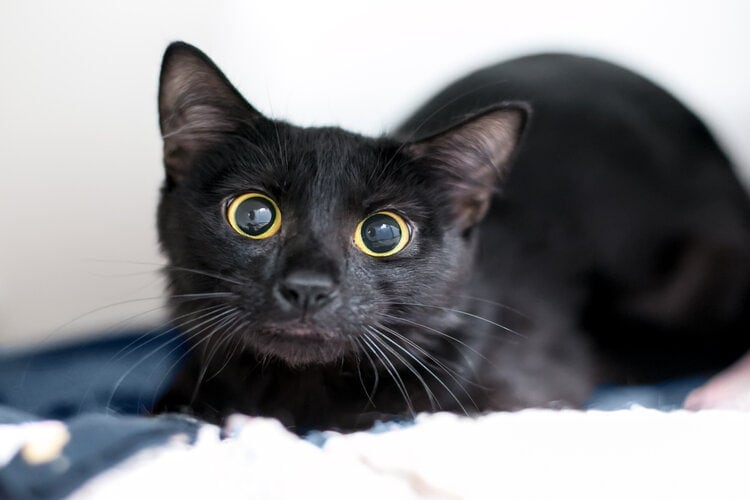
Click to Skip Ahead
When it comes to understanding your feline friend’s behavior, their eyes can offer a wealth of information. One of the most notable changes cat owners may observe is pupil dilation, which can signify various emotional and physical states. If your cat’s eyes are dilated and you’re concerned, we’ll take a closer look in this article, including what’s normal and when you should worry.
The Science Behind Pupil Dilation
Cat pupil dilation, also known as mydriasis, is a fascinating phenomenon that can provide insights into your feline’s emotional and physical state. By observing the size of your cat’s pupils, you can get an idea of their mood, health, and even their thought process.
Pupil dilation in cats is a physiological response controlled by the muscles in the iris, the colored part of the eye. These muscles contract or expand to adjust the size of the pupil, thereby controlling the amount of light that reaches the retina, the light-sensitive layer at the back of the eye. This functionality is crucial for vision, especially in varying light conditions.
Interestingly, the size of a cat’s pupils is not only influenced by light levels but also by their emotional state. When cats experience strong emotions such as excitement, fear, or distress, their pupils often dilate. This is believed to be a survival instinct, as larger pupils allow cats to take in more visual information and react quickly if necessary.

Scenarios for Normal Pupil Dilation
There are several scenarios where it’s normal for a cat’s pupils to dilate:
1. Changes in Light Exposure
Cats’ eyes are specially adapted for seeing in low light conditions. When the light is dim, their pupils dilate and get rounder to allow more light to reach the retina, thereby improving their vision. This is similar to how our own eyes work and is perfectly normal. Additionally, cats have a thin layer behind their retina called the tapetum lucidum that works as a mirror, maximizing the amount of light their retinas receive.

2. Presence of a Predator or Prey
Another scenario where you might notice your cat’s pupils dilating is when they spot a predator or prey. In these situations, their pupils dilate to take in as much visual information as possible. This allows them to assess the situation and react appropriately, whether that means preparing to pounce or making a hasty retreat.
While cat pupil dilation can be a sign of various emotional states and responses to environmental stimuli, it’s also important to note that abnormal or prolonged dilation can indicate health issues. Always consult with a vet if you’re concerned about your cat’s eyes or general health.
Factors Leading to Prolonged Dilation
Prolonged dilation or constriction of a cat’s pupils can be indicative of several factors, ranging from emotional states to various health conditions. A pupil that is working normally should get smaller (constrict) when a bright light is shone on it. Whenever your cat’s pupil dilation is prolonged or unresponsive to bright light, you need to contact your vet for advice. Here’s a deeper look into these factors:
1. Emotional States and Environmental Factors
In some cases, prolonged pupil dilation can be attributed to your cat’s emotional state or changes in their environment. For instance, fear, stress, or excitement can cause your cat’s pupils to dilate for longer than expected. Similarly, exposure to bright light can lead to prolonged pupil constriction as the eyes attempt to limit the amount of light entering the retina. Bright light will cause your cat’s pupil to become a thin line.

2. Health Conditions
Several health conditions can result in prolonged dilation or constriction of a cat’s pupils.
3. Toxins that Can Cause Pupil Dilation
Several toxins can cause pupil dilation in cats. It’s important to keep these substances out of your cat’s reach and be aware of the signs of poisoning. If you suspect your cat has been exposed to a toxic substance, seek immediate veterinary care.
When to Worry
While occasional and transient dilation of a cat’s pupils can be perfectly normal, there are several signs that may indicate a need for concern. These signs warrant immediate veterinary attention:
Conclusion
Understanding the nuances of your cat’s eye behavior can provide valuable insights into their emotional state and health. Recognizing when pupil dilation is normal and when it might signal a problem ensures you can respond promptly to any health issues, helping to maintain your feline friend’s wellbeing. Remember, always consult a veterinarian if you’re concerned about your cat’s eyes or health.
Featured Image Credit: Mary Swift, Shutterstock








